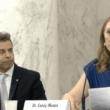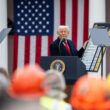The sound and fury and silences of Donald Trump
May 10, 2018
Listening to Donald Trump’s announcement of his decision to withdraw the United States from the Iran nuclear deal (also known as the Joint Comprehensive Plan of Action, or JCPOA) brought to mind Shakespeare’s line about “a tale told by an idiot, full of sound and fury, signifying nothing.” The idiot is “a poor player that struts and frets his hour upon the stage and then is heard no more.” Trump certainly was full of sound and fury. Understanding how to respond to that decision, and the larger structures of thought that are at work, requires more than sifting out the nonsense, half-truths, and falsehoods in Trump’s presentation. It is necessary to pay attention to what Donald Trump did not say.
In Trump’s litany about Iran, and the dangers it poses, and what he aimed to do by way of response, three important silences stand out. There are no doubt other silences worth noting. Still, three are clear.
The first silence: Trump’s greatest fear is that Iran may behave like the United States. For Trump, should Iran get what he called “the world’s most dangerous weapons,” along with “ballistic missiles that could deliver nuclear warheads,” America could be “held hostage to nuclear blackmail “ and American cities “threatened with destruction.” This is all true enough. But one would never know from Trump’s speech that the United States has thousands of nuclear weapons and is the only country to have used such weapons to destroy cities.
If Iran is to be condemned for possibly pursuing this appalling capability, and also be compelled to abandon this quest, what are we to make of the purpose of America’s roughly 4,000 existing nuclear weapons? If the problem is nuclear weapons, beyond supporting the new nuclear ban treaty, what can the world do to eliminate nuclear weapons everywhere, starting with these actually existing weapons?
The second silence: There is nothing in Trump’s statement recognizing that today’s world is an international community of states and peoples, the center of which is the United Nations system. The stated purpose of this system, according to the UN Charter, is “[t]o maintain international peace and security, and to that end: to take effective collective measures for the prevention and removal of threats to the peace.”
Trump described the nuclear deal as “horrible, one-sided… poorly negotiated … decaying and rotten … [and] defective at its core” and claimed that without remedial action “the world’s leading state sponsor of terror will be on the cusp of acquiring the world’s most dangerous weapons.” What Trump did not mention was that the Iran nuclear deal he rejected was unanimously endorsed by the United Nations Security Council.
UN Security Council Resolution 2231 of 20 July 2015 “[c]alls upon all Member States, regional organizations and international organizations to take such actions as may be appropriate to support the implementation of the JCPOA, including by taking actions commensurate with the implementation plan set out in the JCPOA and this resolution and by refraining from actions that undermine implementation of commitments under the JCPOA.” Trump’s action is a clear violation by the United States of this resolution.
What can “[m]ember States, regional organizations and international organizations,” and especially the UN General Assembly and the Security Council, do to assert the legitimacy and mandate of the United Nations in this situation? How can the world hold the United States to account?
The third silence: Trump seems not to consider the possibility of opposition that is so determined, he may not get his way. For Trump, the possibilities and responsibilities of power are his alone: “If I allowed this deal to stand,” he said, things would get much worse, and he alone could fix the problem that is Iran since “[w]hen I make promises, I keep them.” If Iran’s leadership will not submit, “it will have bigger problems than it has ever had before.” There is no doubt in Trump’s mind that eventually Iran will see he was right, and then, “they are going to want to make a new and lasting deal.”
No matter how much he wishes it to be true, Donald Trump, his permissions and commitments, and the power of the American state that he commands cannot shape the entirety of the world’s future. People and their governments everywhere, including American citizens and their representatives, all have a voice, a scope for action. What can they do if they want not to live in Trump’s world? What are the paths for collective, effective resistance and for enabling regime change in Washington?
Zia Mian
physicist and co-director
EXPERT COMMENTARY
Program on Science and Global Security, Princeton University













